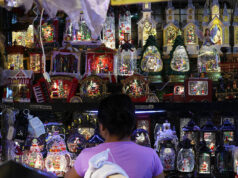Duterte presses Senate on higher alcohol, cigarette taxes
MALACAÑANG is pushing the Senate to approve a proposal to increase the excise tax on alcohol products, cigarettes, heated tobacco and vapor products by certifying “the necessity of the immediate enactment” of the measure concerned, Senate Bill No. 1074.
The certification was made through a Nov. 12 letter from President Rodrigo R. Duterte to Senate President Vicente C. Sotto III that was distributed to reporters on Tuesday.
The certification removes the three-day separation between second- and third-reading approval that is required by current rules on legislation, hence, such a bill can be approved in quick succession within a day.
In his letter, Mr. Duterte cited “the urgent need to generate additional revenue to support the effective implementation” of Republic Act No. 11223, or the Universal Health Care Act which he signed into law on Feb. 20, and which the Finance department estimates has a P63-billion funding gap in its first year of implementation.
The department projects that the Senate version will generate P47.9 billion in 2020 and a total of P356.9 billion over five years.
This is much higher than the revenue expected from the House version — House Bill No. 1026 that was approved on Aug. 20 — amounting to the P16.3 billion in 2020 and a total of P108.9 billion within five years.
SB 1074 proposes to increase the specific tax rate on distilled spirits to P90 per proof liter in 2020 from the current P23.40 and retain the ad valorem tax of 20% of the net retail price (NRP). The specific tax rate is set to increase by P10 until it reaches P120 in 2023.
Sparkling wines will be levied P600 per liter, while still wines and carbonated wines will be taxed at P43 per liter in 2020; with both increasing by 10% annually beginning 2021.
Tax imposed on wines currently vary by the net retail price (NRP) of a bottle or volume of alcohol content. At present, sparkling wines costing up to P500 and those costing more than P500 are levied P316.33 and P885.72, respectively.
Rates on still wines and carbonated wines are currently at P37.96 for bottles with up to 14% alcohol content and P75.92 for those with over 14% alcohol.
The Senate version also proposed to tax fermented liquor with P45 per liter in 2020; P55 in 2021; P65 in 2022; and P75 in 2023; from there, the rate will increase by 10% every year starting 2024.
The same rates will be imposed on alcopops, or “pre-mixed alcoholic beverages with alcohol content less than 10% alcohol by volume and which alcohol is from malt or wines or a distillation process.”
In comparison, HB 1026 proposed the following rates on distilled spirits: 22% ad valorem tax on NRP and a specific tax rate of P35 in 2020, which will increase by P5 every year until 2022; and by seven percent annually starting 2023.
An ad valorem tax of 15% on NRP and a P650 specific tax rate with a seven percent annual indexation will be imposed on sparkling wines.
Moreover, still and carbonated wines with up to 14% alcohol content will be charged P40 per liter, while those with more than 14% will be charged P80 per liter for those with more than 14% alcohol.
Rates for fermented liquors and alcopops will be increased to P32 per liter in 2020 from the current P25.42.
The same measure will also amend Republic Act No. 11346 — which was enacted last July 25 — by raising the excise tax on tobacco products to P60 per pack by 2023 from P35 currently, and introduce a P10 per pack rate on heated tobacco products in 2020.
It also introduced the following rates on vapor products: P10 for 10 milliliter vapor products, P20 for 20 ml, P30 for 30 ml, P40 for 40 ml, P50 for 50 ml and so on.
Both versions proposed to increase the rates on heated tobacco products to P45 per pack beginning 2020 to put them at par with regular tobacco products. This will increase by P5 annually until 2023.
The Senate version further proposed to increase rates on vapor products to P45 per 10 milliliter in January, whether they use nicotine salts or classic nicotine. The rate will increase by P5 per year until it reaches P60 in 2023.
This reform forms part of the administration’s comprehensive tax reform program, alongside measures that seek to reduce corporate income tax and streamline redundant fiscal incentives; centralize real property valuation and assessment; and simplify the tax structure for financial investments.
Aside from RA 11346, the government has so far passed Republic Act No. 10963, which slashed personal income tax rates and increased or added levies on several goods and services; and RA 11213, the Tax Amnesty Act, which grants estate tax amnesty and reprieve on delinquent accounts left unpaid even after being given final assessment. — G. M. Cortez



